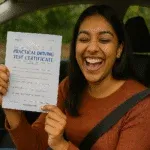How to Book Driving Test: A Step-by-Step Guide
Booking your driving test through the DVLA can feel overwhelming, but with this step-by-step guide, you’ll find it easier to navigate the process. Whether you’re a learner trying to earn your first driving license or someone looking to retake the test, understanding how to proceed can make a significant difference.
Before you begin, it’s essential to have certain information and documents ready. This preparation will streamline your booking process and ensure you don’t miss any important steps.
- Provisional Driving License: Ensure that you hold a valid UK provisional driving license. This is mandatory to book your driving test.
- Personal Details: Have your full name, address, and date of birth at hand for the booking.
- National Insurance Number: This number can help verify your identity.
- Payment Method: You’ll need a debit or credit card to pay for the test fee.
Once you have everything ready, you can follow these steps to book your driving test with the DVLA:
Step 1: Access the Official DVLA Website
The first thing to do is to visit the official DVLA website. This ensures that you are using a legitimate source to book your driving test. Be wary of third-party websites that might charge extra fees.
Step 2: Navigate to the Booking Section
On the DVLA homepage, look for the section dedicated to driving tests. This can usually be found under the “Learn to Drive” or “Driving Tests” categories. There will be a specific link for booking your driving test.
Step 3: Choose the Type of Test
There are different types of driving tests, including:
- Car driving test
- Motorcycle driving test
- ADI part 2 (for driving instructors)
- ADI part 3 (for driving instructors)
Select the type of test you want to book. For most, this will be the standard car driving test.
Step 4: Enter Your Details
Next, fill in the required personal details including your provisional driving license information. Ensure all information is accurate to prevent any issues later on.
Step 5: Pick a Test Centre
You will be prompted to select a driving test centre. Here’s how to choose the right one:
- Location: Choose a centre close to your home or where you plan to drive most frequently.
- Availability: Check for available dates and times that fit your schedule.
- Reviews: Consider looking up reviews on test centres to see if others have had positive experiences.
Step 6: Select a Date and Time
After choosing your test centre, you will be presented with available dates. Select one that allows you enough time to prepare but also fits your needs. Remember to check your calendar for any conflicts.
Step 7: Payment
You will need to pay a fee when booking your driving test. The current cost for a car driving test is £62 during weekdays and £75 on weekends and evenings. Ensure that you have your payment method ready.
Step 8: Confirm Your Booking
Review all the information you’ve entered to ensure it’s correct. Once confirmed, submit your booking. You should receive a confirmation email shortly after.
Step 9: Prepare for Your Test
With your test booked, now it’s time to prepare! Consider taking driving lessons leading up to your test day. Practice your driving skills, and make sure you are familiar with the route you will be taking.
| Test Type | Weekday Fee | Weekend Fee |
|---|---|---|
| Car Driving Test | £62 | £75 |
| Motorcycle Driving Test | £75 | £85 |
By following these steps, you can confidently book your driving test with the DVLA. Remember, preparation is key, and taking the time to understand the process will help you stay calm and focused as your test day approaches.
Common Mistakes to Avoid When Booking Your Driving Test
Booking your driving test is a crucial step on your journey to becoming a qualified driver. However, many people make common mistakes that can delay their progress or result in a failed attempt. Understanding these pitfalls can ensure a smoother booking process and a higher chance of success on your test day. Here are some key mistakes to watch out for when you decide to DVLA book driving test.
Not Choosing the Right Date
One of the first mistakes many make is not carefully selecting the date for their driving test. It’s important to consider:
- Your readiness: Make sure you feel confident in your skills and have enough practice.
- Examiner availability: Some dates may be busier than others. Look for times less in demand.
- Personal commitments: Avoid dates close to important events that might distract you.
Ignoring the Requirements
Before you DVLA book driving test, familiarize yourself with all the requirements. This can include:
- Provisional license: Ensure your provisional license is valid and up to date.
- Documentation: Read up on what documents you need to bring to the test.
- Car Regulations: Ensure your car meets all necessary regulations for the test.
Overlooking the Online Systems
The DVLA website offers an efficient way to book your driving test. However, many overlook this and face complications by:
- Not creating an account: Set up an account for easier access to your bookings and information.
- Filling out incorrect information: Double-check your details to avoid any booking errors.
- Forgetting to confirm: Always confirm your booking to receive a confirmation number.
Failing to Practice Accordingly
Practice is crucial before your test. Many mistakenly underestimate the amount needed. Here are some tips:
- Take lessons: Invest in quality driving lessons with a qualified instructor.
- Practice with family or friends: Gain additional experience under various conditions.
- Mock tests: Use mock tests to simulate the actual driving test experience.
Not Considering Test Conditions
Some test-takers do not account for potential weather conditions on the day of their test. Here’s why this matters:
- Visibility: Poor visibility can affect driving. Ensure you can handle such scenarios.
- Road Conditions: Rain and snow may make roads slippery, so practice driving in all possible conditions.
- Traffic Levels: Peak hours may pose challenges, consider quieter times for your test.
Neglecting Emotional Preparation
Many drivers overlook the importance of being mentally prepared. It’s normal to feel nervous, but you can manage this by:
- Visualizing success: Picture yourself successfully passing the test.
- Breathing exercises: Practice breathing techniques to calm your nerves before the test.
- Talking with instructors: Share your concerns with your driving instructor for helpful advice.
Not Reviewing the Driving Test Structure
Understanding what to expect on test day can ease anxiety. Make sure to review:
- The driving maneuvers: Study common maneuvers that are part of the test.
- Scoring system: Learn how you will be assessed during the test.
Avoiding these common mistakes when you DVLA book driving test will not only help to streamline the process but increase your chances of passing. Take your time in preparing, practice thoroughly, and remember to take care of your mental health before the big day. Good luck, and drive safely!
Understanding the Different Driving Test Options Available
When it comes to obtaining your driving license, understanding the different driving test options available is essential. Each option serves a unique purpose and caters to the varying needs of drivers. This guide breaks down these options to help you make an informed decision.
Standard Driving Test
The standard driving test is the most common route for new drivers. This test assesses your ability to operate a vehicle safely and efficiently. Here are the key components:
- Theory Test: Before taking the practical driving test, you must pass a theory test, which includes multiple-choice questions and hazard perception evaluations.
- Practical Driving Test: You’ll be evaluated on your driving skills, including vehicle control, awareness of road conditions, and adherence to traffic regulations.
Automatic vs. Manual Driving Tests
Another aspect to consider is whether you want to take an automatic or manual driving test. The choice depends on your preferences and driving habits.
- Automatic Driving Test: This test allows you to drive vehicles with automatic transmission. Once you pass, your license will only permit you to drive automatic vehicles.
- Manual Driving Test: This test requires you to operate a vehicle with a manual transmission. Passing this test allows you to drive both manual and automatic vehicles, providing more flexibility.
Extended Driving Test
The extended driving test is designed for drivers who may need additional instruction or have previous driving penalties. This test focuses on more advanced driving techniques and situational judgment. Typically, this option is recommended for:
- Drivers who have had their license revoked
- Individuals with a history of serious driving offenses
- Drivers returning to the licensing system after a lengthy break
Driving Tests for Specific Needs
There are driving tests catered to drivers with specific needs, including those who are elderly or have disabilities. These tests assess your ability to operate a vehicle in a way that meets your personal requirements.
- Older Drivers: Some driving centers offer tailored assessments for elderly drivers to determine if they are fit to drive safely.
- Disabled Drivers: For individuals with physical disabilities, adaptive equipment may be necessary. A specialized test measures the driver’s ability to safely control the vehicle with such modifications.
International Driving Test
If you plan to drive abroad, you might need an international driving permit (IDP). This document translates your license into multiple languages and is often required by foreign authorities. Here’s a quick overview:
| Country | IDP Required |
|---|---|
| USA | Varies by state |
| Australia | Yes |
| France | Yes |
How to Schedule Your Driving Test
Booking your driving test is the next crucial step. The DVLA provides a straightforward way to schedule your test online. Here are the steps to follow:
- Visit the DVLA website.
- Choose your preferred test type from available options.
- Select a convenient date and time.
- Pay the necessary fee.
Preparing for the Driving Test
Once you’ve selected your driving test option, preparation is key to success. Consider the following tips:
- Practice Regularly: Work with a qualified instructor or experienced driver to refine your skills.
- Study the Highway Code: Brush up on road signs, regulations, and driving techniques.
- Take Mock Tests: Simulate the test experience to build confidence.
By understanding the different driving test options available, you can choose the one that best suits your needs and confidently prepare for your journey toward obtaining your driving license. Whether you opt for a standard, automatic, or extended driving test, being well-informed will enhance your chances of passing and ultimately enjoy the freedom that comes with driving.
Tips for Preparing Effectively for Your Driving Test
Preparing for your driving test can feel overwhelming, but with the right strategies, you can build confidence and increase your chances of success. Here are some effective tips to ensure you are well-prepared.
Understand the Test Format
Before you even get behind the wheel, it’s important to know what to expect. Familiarize yourself with the driving test format in your area. This typically includes an eyes test, vehicle safety questions, and a driving assessment. Knowing the layout can help ease anxiety and provide clarity.
Practice Regularly
Consistent practice is key. Make sure to devote time each week to practice driving. Aim for diverse environments—residential areas, highways, and parking lots—to become comfortable with various driving conditions. Set aside specific practice times, so it becomes part of your routine.
Take Practice Tests
There are plenty of online resources that allow you to take practice driving tests. These can help you understand the theory behind driving, as well as the types of questions you may encounter on the actual test. Consider printing out your state’s driving manual and using it for reference while practicing.
Get Familiar with Your Vehicle
Knowing your vehicle inside and out can eliminate stress. Spend some time familiarizing yourself with its controls, including lights, wipers, and turn signals. Practice basic maneuvers such as parking, reversing, and emergency braking in a safe environment.
Take Professional Lessons
If possible, consider enrolling in a few lessons with a professional driving instructor. They can provide valuable feedback on your driving skills and pinpoint areas needing improvement. This professional perspective can help you feel more prepared and confident on test day.
Check Your Documentation
Prior to the test day, ensure you have all necessary documentation ready. This often includes:
- Driving permit
- Pass certificates from any required courses
- Proof of identity
Having everything in order will reduce stress and avoid surprises at the test center.
Rest Well Before the Test
Rest is crucial for optimal performance. To ensure you are mentally prepared, get a good night’s sleep before the test. Avoid cramming or studying last minute, as this can lead to increased anxiety. Instead, take time to relax the night before.
Arrive Early
On test day, plan to arrive early. This gives you time to gather your thoughts before the assessment and adjust to the environment of the testing center. Being rushed can heighten your stress, so aim to arrive at least 15-20 minutes early.
Stay Calm During the Test
Once your test begins, it’s important to stay calm. If you make a mistake, don’t dwell on it. Focus on your driving and remember that this is just one part of the test. Take deep breaths if you start to feel the pressure mounting.
Listen to the Examiner
During the driving test, listen carefully to your examiner’s instructions. They will provide guidance on what you need to do next. Engaging with them can also help ease your nerves and create a more comfortable atmosphere.
Practice Defensive Driving
Remember, part of your evaluation will include how well you assess and respond to other drivers’ actions. Always keep an eye on your surroundings and practice defensive driving techniques, such as keeping a safe distance and correctly signaling your intentions.
Keep a Positive Mindset
Maintaining a positive attitude can make a significant difference. Visualize yourself successfully completing the test and remind yourself that it’s okay to be nervous. Many people have been in your shoes and have gone on to become great drivers.
With these tips, you can approach your driving test confidently. Remember, preparation is key, and taking the time to focus on your skills will pay off. Good luck!
The Importance of Timing: Best Times to Book Your Driving Test
Timing plays a crucial role in many aspects of life, and booking your driving test is no exception. Understanding when to schedule this important milestone can significantly influence your chances of success. Whether you’re a new driver anxious to hit the road or someone looking to regain their license, knowing the best times to book your driving test can make all the difference.
When considering the best times to book your driving test, there are several factors to keep in mind. These include peak times for testing centers, the seasons, and even the days of the week. Let’s explore these aspects in detail.
Understanding Peak Testing Times
Driving test centers experience heightened demand at specific times during the year and week. Understanding these peak and off-peak times can help you choose the best moment for your test.
Peak Times
- Summer Months: The summer is often a busy period for driving tests as students and new learners tend to book their tests during school holidays.
- Weekends: Saturday tests can often be fully booked since many learners prefer to take the test when they’re not in school or at work.
- After Holidays: Right after holiday seasons, particularly in January, many new learners rush to book tests, leading to higher competition for slots.
Off-Peak Times
- Mid-Week: Tuesdays and Wednesdays generally see fewer bookings, making it easier to find available slots.
- Winter Months: The cold months of November to February often see fewer candidates, meaning your chances of getting a test at your preferred time are higher.
- The School Term: The period during school sessions typically has fewer bookings compared to holidays.
The Best Days to Book
Choosing the right day can also play a significant role in your driving test experience. Some days might yield better outcomes than others.
| Day | Advice |
|---|---|
| Monday | Often busy, candidates are less focused after the weekend. |
| Tuesday | Relatively quiet, making it an excellent option for your driving test. |
| Wednesday | Mid-week calmness; enjoy a less tense atmosphere. |
| Thursday | May have higher bookings as candidates prepare for the weekend. |
| Friday | Mixed day; some candidates want to finish the week with a test. |
| Saturday | Very busy; weekend rush can lead to nerves. |
| Sunday | Typically closed for tests, but a good day to practice. |
Seasonal Considerations
Different seasons bring unique challenges. Understanding how to leverage the seasons is important when planning your test.
- Spring: Mild weather makes driving easier, but the influx of learners can lead to crowded testing centers.
- Summer: Long days provide good visibility, but expect high demand for test slots.
- Autumn: The weather changes can bring unpredictable conditions, so being cautious is key.
- Winter: Cold and possibly icy conditions may affect driving habits, leading some to postpone until spring.
Choosing the right time to book your driving test is more than just picking a date; it requires a strategic approach. Understanding peak and off-peak times, selecting the best days to take the test, and considering the seasonal aspects can greatly enhance your chances of passing. Each factor plays a role in shaping your overall experience, allowing you to approach your driving test with confidence.
By applying these strategies, you can ensure that you’re booking your driving test at a time that aligns with your readiness, and skill level, creating the best possible environment for success.
Key Takeaway:
Booking your driving test with the DVLA can seem daunting, but with the right guidance and preparation, you can navigate the process smoothly. Here are the key takeaways from the article, designed to help you understand and excel in your journey toward obtaining your driver’s license.
First and foremost, knowing how to DVLA book driving test is crucial. The booking process is straightforward if you follow a step-by-step guide. Make sure you have your provisional driving license handy, as this is often required for the booking. You can book your test online, by phone, or through the post, depending on what works best for you. Take your time to fill out the required information correctly to avoid delays.
Next, it’s essential to be aware of common mistakes that can derail your booking. Overlooking important details, such as dates or locations, can cause confusion and frustration. Double-checking your information and being aware of the commitment will save you time and stress.
Understanding the different driving test options available is another vital component. In the UK, there are various types of driving tests, including standard car tests, motorcycle tests, and special tests for larger vehicles. Knowing which test suits your needs will help you prepare better and choose the right time to book.
Preparation is key to success. You should allocate ample time for practice and consider tips for effective study. This includes taking lessons from qualified instructors, practicing in diverse driving conditions, and familiarizing yourself with the test route.
Consider the timing of your test. It’s generally advisable to book your driving test during quieter periods to increase your chances of passing. Early mornings or midweek days are often less busy than weekends or holidays, leading to a more relaxed testing experience.
Booking your DVLA driving test is a multi-faceted process that requires attention to detail and careful preparation. By understanding how to book, avoiding common pitfalls, exploring test options, and preparing effectively, you set yourself up for success. Remember, the right timing can also make a difference in your testing experience. With these insights, you are now better equipped to take the next steps toward earning your driving license. Good luck!
Conclusion
Booking your driving test with the DVLA is a key step toward gaining independence on the road. By following a step-by-step guide, you can simplify the process and alleviate unnecessary stress. Avoiding common mistakes such as incorrect personal details or selecting the wrong test type can save you time and frustration. Make sure to understand the different driving test options, as this knowledge empowers you to choose the best fit for your skill level.
Preparation is crucial. Implementing effective study and practice tips can significantly boost your confidence and readiness for the test. The right timing also plays an essential role. Knowing the best times to schedule your test can not only increase your chances of success but also reduce waiting times, making the entire process smoother.
As you embark on this journey, remember that patience and persistence are vital. Focus on your preparation, stay calm, and embrace the learning experience. Whether you’re a new driver or looking to refresh your skills, being informed and well-prepared will lead you to success. Your driving test is an important milestone, and with the right approach, you can navigate it confidently and efficiently. Keep these insights in mind as you book your driving test with the DVLA, and look forward to hitting the road safely and proudly in no time.







